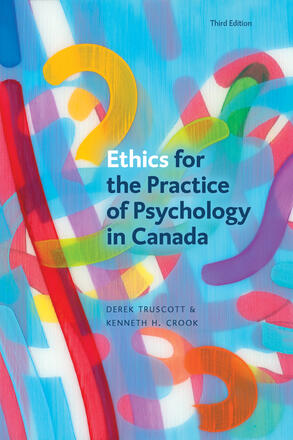Preface to the Third Edition xv
Acknowledgements xix
1 | Understanding Ethics
Case Study: A Client in Need 2
Four Foundational Systems of Ethics 5
Teleology 6
Deontology 7
Virtue 8
Relational 9
Systems of ethics appraised 9
Canadian Code of Ethics for Psychologists 11
Principle I: Respect for the dignity of persons and peoples 13
Principle II: Responsible caring 14
Principle III: Integrity in relationships 14
Principle IV: Responsibility to society 15
Canadian Code of Ethics for Psychologists appraised 16
Summary 17
Case Studies 19
Professor under pressure 19
Negative outcomes 19
Reluctant parolee 19
2 | Making Ethical Decisions
Case Study: Child Abuse 2
Ethical Reasoning 25
Listen / Relational 26
Feel / Virtue 26
Think / Deontology 26
Act / Teleology 27
Making Ethical Decisions 27
1. Identification of individuals and groups likely to be affected by the
decision: Listen / Relational 28
2. Consideration of personal bias, stress, or self-interest: Feel / Virtue 29
3. Identification of relevant ethical principles, standards, and
guidelines: Think / Deontology 30
4. Development of alternative courses of action: Think / Deontology 31
5. Analysis of likely short-term, ongoing, and long-term risks and
benefits of alternatives: Think + Act / Deontology + Teleology 32
6. Choice of course of action: Act / Teleology 34
7. Action 34
8. Evaluation of the results of the course of action: Listen / Relational 36
9. Assumption of responsibility for consequences of action taken:
Feel / Virtue 36
10. Appropriate action to prevent future occurrences of the dilemma:
Think + Act / Deontology + Teleology 37
Summary 38
Case Studies 39
Offender treating offenders 39
Do your job 39
Need to know? 40
3 | Meeting Professional Standards
Case Study: A Psychologist by Any Other Name 42
Professional Standards 44
Entrance standards 44
Practice standards 47
Practice guidelines 48
Professional Accountability 49
Ethics committees 50
Discipline committees 50
Complaints against psychologists 52
Case Study of a Complaint 53
Complaint 53
Investigation 54
Discipline hearing 54
Regulating Ourselves 55
Confirm the issue 55
Safeguard confidentiality 56
Consult with others 56
Address the issue 56
Involve others in an action plan 57
Summary 57
Case Studies 58
A good night’s sleep 58
Assessments under the table 58
Meddling misogynist 59
4 | Incorporating Legal Expectations
Case Study: Haunted by Grief 62
Areas of Law 65
Criminal 65
Civil 44
Negligence 67
Duty of care 67
Reasonable care 68
Causation 68
Plaintiff’s conduct 69
Relationships and Consequences Relevant to Legal Expectations 70
Intervention 70
Assessment 71
Suicide 72
Harm to third parties 74
Summary 76
Case Studies 78
Think of the children 78
Said too much 78
Wrong man 79
5 | Obtaining Consent
Case Study: Parental Refusal 82
Duties and Virtues Fundamental to Consent 84
Autonomy 84
Fidelity 85
Relationships and Consequences Relevant to Consent 86
Standards of disclosure 86
Freedom of consent 88
Process of consent 90
Children 92
Dependent adults 95
Assessing competence 96
Summary 97
Case Studies 98
Eternal soul 98
Mind reader 98
On his own terms 99
6 | Protecting Confidentiality
Case Study: Marital Secrets 102
Duties and Virtues Fundamental to Confidentiality 105
Autonomy 105
Discretion 106
Relationships and Consequences Relevant to Confidentiality 107
Third-party access to information 107
Client access to information 108
Legal proceedings 109
Group and family therapy 111
Children and dependent adults 112
Mandatory reporting of a child in need of protection 113
Technological threats 115
Summary 117
Case Studies 118
Cooking the books 118
Troubled student 118
Whose records? 119
7 | Helping without Harming
Case Study: To Treat or Not to Treat? 122
Duties and Virtues Fundamental to Helping without Harming 125
Beneficence and benevolence 125
Nonmaleficence and nonmalevolence 125
Diligence 126
Relationships and Consequences Relevant to Helping without Harming 127
Establishing competence 127
Maintaining competence 128
Expanding services 131
Monitoring outcomes 133
Avoiding accusations of harm 134
Summary 136
Case Studies 138
Recovering alcoholic 138
Best for whom? 138
Tyranny of metrics 139
8 | Maintaining Professional Boundaries
Case Study: New Business Partner 142
Duties and Virtues Fundamental to Professional Boundaries 145
Nonmaleficence and nonmalevolence 145
Temperance 146
Relationships and Consequences Relevant to Professional Boundaries 147
Practicing in isolated communities 147
Third parties 149
Teaching and supervision 150
Physical contact 152
Social relationships 152
Sexual relationships 154
Summary 156
Case Studies 158
Past catches up 158
Custody dispute 158
Nobody does it better 158
9 | Appreciating Diversity
Case Study: Hearing Voices 162
Duties and Virtues Fundamental to Appreciating Diversity 165
Respect 165
Nonmaleficence 166
Beneficence 167
Relationships and Consequences Relevant to Appreciating Diversity 167
Group membership 167
Individual identity 169
Assessment 171
Intervention 174
Research 176
Summary 177
Case Studies 179
Real-world assessment 179
Protection from whom? 179
The cost of friendship 180
10 | Being Socially Responsible
Case Study: A Shelter in Need 182
Duties and Virtues Fundamental to Social Responsibility 185
Justice 185
Respect for authority 186
Relationships and Consequences Relevant to Social Responsibility 187
Advancing the discipline 187
Access to services 189
Misuse of psychological knowledge 190
Social intervention 192
Social activism 194
Summary 197
Case Studies 198
Robbers Cave redux 198
The disruptive student 198
Banality of evil? 199
11 | Conducting Research
Case Study: Political Violence 202
Duties and Virtues Fundamental to Conducting Research 205
Autonomy 205
Beneficence and nonmaleficence 206
Justice 206
Integrity 207
Relationships and Consequences Relevant to Conducting Research 208
Consent 208
Privacy 211
Confidentiality 212
Children and vulnerable persons 214
Scientific misconduct 216
Summary 219
Case Studies 220
Blow the whistle? 220
Safe youth 220
Proposal with potential 220
Appendix: Learning Resources 223
References 239
Index 251
